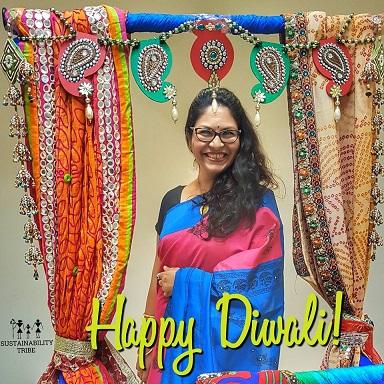Diwali is a centuries-old, largest festival in India and is also known as Festival of Lights! Diwali symbolizes the victory of light (goodness) over dark (evil)! But as it happens with almost all religions and traditions, the intention behind the festival and rituals start taking back seat and consumerism, using festivity for marketing takes center stage.
So sadly now people mainly relate Diwali to buying new things, gifts and firecrackers in India and outside! But frankly Diwali is not about shopping and consuming, it’s a victory of goodness you remember? So do you think consuming more things (most times unnecessary) and increasing waste is good in any way or especially during Diwali?
Firecrackers are not part of Diwali!
If you talk about firecrackers, firstly this is a very recent addition to the festival of Diwali! Firecrackers are invented in China and they reached India just 2-3 centuries back and systematically marketed and associated with Diwali in 1923 by a match factory owner, read this article to know more!
Secondly, air pollution is already at its peak and more and more people especially children are suffering through respiratory diseases, so adding more concentrated pollution to air during Diwali sounds good to you? Frankly, for years my brother who had childhood asthma used to avoid going out on the day of Diwali as the polluted air was very harmful to him! I haven’t taken my son to India in Diwali for the last 4 years during Diwali, in fear of not exposing him to that concentrated firecracker smoke and almost unstoppable sound pollution.
Unfortunately, that fact is, people in India for a few years are cracking bigger and louder firecrackers to show how wealthy they are. I am not kidding, but it’s a mark to show your success, where in fact they kind of show off that they are fooled by that marketing tact started in 1923! Plus it’s sad to see the waste from firecrackers scattered all over the streets the next morning! So firecrackers of Diwali are not only non-Eco-friendly and harmful for us but also are not really part of Diwali at all!
Diwali Rituals

I will not go deeper into the significance of 5 days of Diwali or mythological stories, those you can find on Wikipedia, but would love to discuss some age-old Diwali rituals which are even necessary for healthy living!
Before Diwali, Indians clean their houses, for me, it’s time to do yearly deep-cleaning of my home to make it non-toxic!
Some typical Diwali sweets and delicacies are made before Diwali days! During this festival, Indians meet their family and friends to share joys and these Diwali sweets!
‘Abhyanga Snan’ is performed during Diwali mornings, mainly on Narakchaturdashi! Traditionally early morning women massage kids, the husband with essential oils and then perform ceremony “ovalaney” with ghee lamp & then ubtan made of natural ingredients are used during the bath. Abhyanga snan keeps skin healthy and moisturized. Over the years ubtan was replaced by soaps, but we can always choose Eco-friendly soap made of natural materials that come in Eco–friendly or no packaging!

Eco-friendly Diwali Tips
1. Use Oil Lamps
Using oil lamps instead of wax lamps. Remember Palm wax candles are even more unethical, as every year palm cultivators in Indonesia (largest palm producer) burn forests to cultivate palm. This doesn’t just add up a huge amount of carbon emissions but also create a significant threat to wildlife like Organutan and local people. Among candles, soy candles can be a more sustainable solution. But the comparatively most sustainable way to light up Diyas is to use recycled cooking (fried) oil after making those Diwali sweets. Better to use traditional handmade cotton wick for lamps.
2. Buy Local
Using natural soaps and oils for Abhyanga. As we are living in Dubai I preferred a soap made from the local natural ingredient, camel milk. You can even find a range of baby soaps at Camel Milk Factory
3. Reduce Waste
I love to make Rangoli designs for years, but for a few years my son hardly keeps the Rangoli at my door for an hour without spoiling it. I have switched to these wooden Rangoli pieces which you can arrange in different formations. Frankly, I am liking this Rangoli more as it’s waste-free Rangoli helping my #ZeroWasteUAE attempt as well.
4. Solar Lanterns
Solar lanterns and solar light garlands are one more sustainable and Eco-friendly option to decorate your home or outdoors.
5. Ditch new clothes shopping
Instead of buying new traditional clothes and jewelry every Diwali, you can always wear vintage fashion, maybe a beautiful saree passed on by your mum or grandmother, why not opt for haulternative than buying new.
6. Diwali Gifts
If you are buying Diwali gifts for loved ones or friends, before going for gift shopping read our detailed sustainable gifting guide. Buying green gifts not just helps to reduce adverse impacts on the environment but you can also support social initiatives and it’s a great way to pass on sustainable thoughts via gifts!
This year shopping wise we are celebrating almost ‘no spend Diwali’, we saved ourselves from the hassle of going to Meena Bazar in horrible traffic and then adding some more clutter to home which we will probably use directly in next Diwali. At least I can see my husband is really happier by ditching Diwali shopping altogether! Diwali is about spreading happiness, isn’t it?
Here is the original Sustainability Tribe wishing you all a Happy Diwali wearing our older traditional clothes!

Happy Diwali!

